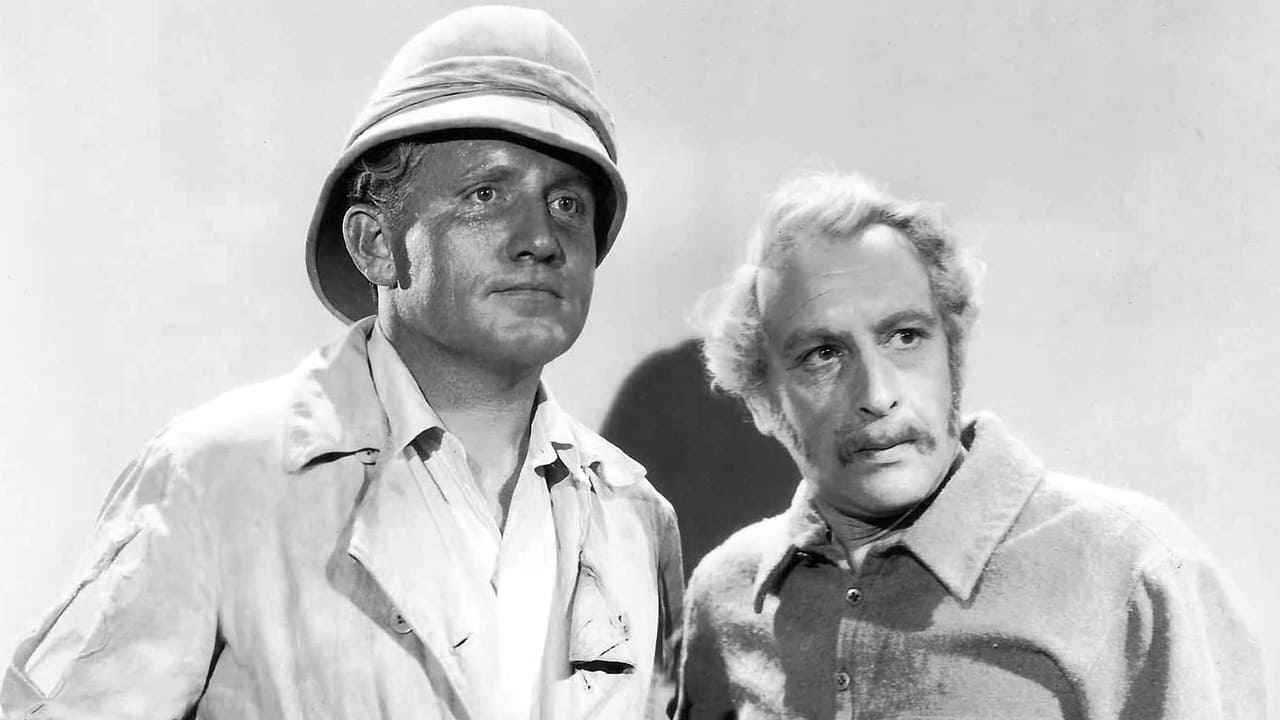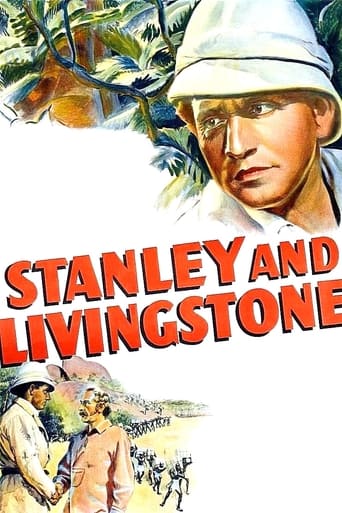

Who payed the critics
... View MoreStrong and Moving!
... View MoreWhile it doesn't offer any answers, it both thrills and makes you think.
... View MoreLet me be very fair here, this is not the best movie in my opinion. But, this movie is fun, it has purpose and is very enjoyable to watch.
... View MoreThe interesting part of this film is the friendship between Stanley and Livingstone as transmitted by Spencer Tracy and Cedric Hardwicke. It's the ideal kind of role for Spencer Tracy, and he would continue developing characters in that direction still for many years to come up to the judge in "Judgement at Nuremberg" 1961. Cedríc Hardwicke makes the most credible possible Dr. Livingstone as both a missionary and a doctor, a character and mission later carried on by Albert Schweitzer. The great encounter is framed by a very epic adventure of Africa exploration, and this could be Henry King's best film - he certainly wouldn't always be that good. Almost the whole film is of a journey, starting carefully in Zanzibar presenting already from the beginning the major complications of infection - one presumes it is malaria - and how it must affect any European for life, like as if Africa in itself was an unavoidable mortal illness for any daring visitor. Spencer Tracy really knocks it off when he has to defend his exploits to the Royal Geographical Society of London headed by Charles Coburn as Stanley's leading newspaper competitor, a London journal completely dominating the field and feeling the threat of New York Herald. It's a great adventure film above all but very much enhanced and lifted to higher levels by the acting of Spencer Tracy and Cedric Hardwicke.
... View MoreI think it's difficult for people today to understand just how famous this story was. Even in the 1950s, when I was an elementary school student in the U.S., I remember studying this story and being rather fascinated by it. Today, at least in America, it is simply a footnote to history.This is a splendid movie on several accounts. First, though on loan from MGM to 20th Century Fox, this was another of the solid screen performances, during this general period of time, which catapulted Spencer Tracy to the top of his profession. There are two scenes here which are most memorable. Of course, the "Dr. Livingstone, I presume" theme, and, near the end of the film, the scene where he begins his tirade against the forces which are attempting to diminish the discoveries of Dr. Livingstone. The latter, in particular, is another of those movie scenes where Tracy proves -- once again -- that often less in more, and his understated acting coupled with occasional outbursts of energy is very powerful.Another factor in making this such a fine film is that although most of the acting was filmed here in the United States, many of the Safari scenes had been filmed in Kenya, Tanzania, and Uganda -- without Tracy -- two years earlier. The different segments are blended together quite well to make a rather convincing story.Supporting actors are uniformly excellent here. Worth special mention are Charles Coburn in a not very likable performance as a somewhat unscrupulous newspaper owner, Cedric Hardwicke as Dr. Livingstone, Walter Brennan as the inevitable sidekick to Tracy, and Hencry Travers as a somewhat befuddled diplomat.In fact, it's difficult to find much to criticize in this film, other than historical accuracy. However, if we keep in mind how the movie industry always treated historical accuracy, this film is about average in that respect.There are enough compelling incidents in the script to keep things moving along well, and -- if you can put aside the historical inaccuracies -- you'll probably greatly enjoy this film.
... View MoreStanley and Livingstone (1939) *** 1/2 (out of 4) Spencer Tracy plays Henry M. Stanley, an American explorer and newsman who is given the job of traveling to Africa so that he can see whether or not the missionary Dr. Livingstone (Cedric Hardwicke) is dead. When Stanley shows up in Africa, after a year's journey, he finally finds Livingstone alive and sees that he's trying to bring religion to Africa as well as trying to educate the people. Since Africa is still seen as a mystery to the outside world, both men must convince the rest of the world that Africa isn't the "dark country" but a place that should be explored. I was extremely caught off guard with how well made and entertaining this movie was. I hadn't heard too much about it over the years but it was certainly a delight to finally watch it and discover it to be a real gem. I've heard that a lot of the story was made up or changed to make it seem better, which is fine with me since this is a movie and not a documentary. As a movie the film contains a very big heart towards the people in Africa, who at the time, were still being sold as slaves and looked at as cannibals. There's also a lot of nice footage of the jungles of Africa, although it's clear that neither Tracy or Hardwicke are ever there since they are never in the scenes. The production value of the fake Africa look very good and the direction is very strong throughout. It should go without saying but Tracy delivers another great performance and his final speech at the end is really heartfelt. You can really see the pride, passion and anger floating out of Tracy to the point where you'd think he was the real Stanley delivering his message. Hardwicke actually steals the film in his few scenes in the movie. The love and compassion he gives off is a great joy to watch. Nancy Kelly, Richard Greene, Henry Hull, Walter Brennan and Henry Travers all deliver nice supporting work.
... View MoreIf any of you have read some of my reviews of other films, you'll note that I've said that Jim Bowie of all the colorful frontier characters in American history gets the biggest whitewash in films. The man was a notorious scoundrel and half of this film is devoted to another scoundrel.Henry M. Stanley was just such a scoundrel. The film does not go at all into his later life as a paid shill of King Leopold of Belgium and his brutally administered regime in the Belgian Congo. Nor does it mention when he came to America, he enlisted and deserted from both sides of the Civil War.Stanley found his calling as a reporter for the New York Herald where on the strength of his reporting on the American Indian wars, editor James Gordon Bennett decided he was the guy to send to Africa and scoop the English papers in a search for famed missionary Dr. David Livingstone.Whatever else he was, Stanley was a brave man and his explorations into Africa added considerable knowledge for the Caucasian world about that continent.As for Livingstone, by all indications he was a Christian who did walk the walk in his beliefs in life and probably would have been aghast at Stanley's later activities with the Belgian Congo.Spencer Tracy plays Stanley as if he was doing one of his roughneck characters who finds the piety of a Father Flanagan in the African jungle. Cedric Hardwicke is a very proper and pious David Livingstone. Hardwicke's portrayal is the truth and Tracy does put his characterization of Stanley across, false though it is in real life.This was Spencer Tracy's only film away from MGM for the time he was under contract to them. It was for his former studio 20th Century Fox and he certainly never got as big a budget on his previous films with them except possibly Dante's Inferno.Though the film takes incredible liberties with the facts, fans of Spencer Tracy might like this story of a scoundrel in search of a saint in the jungle.
... View More